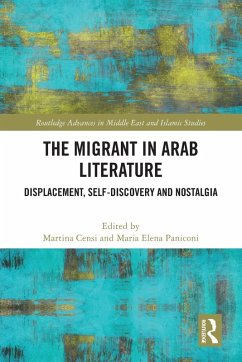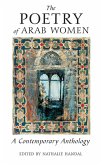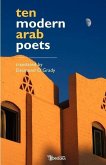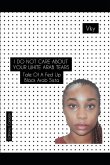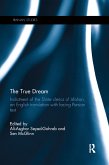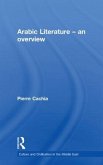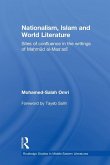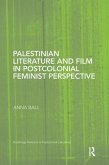The Migrant in Arab Literature
Displacement, Self-Discovery and Nostalgia
Herausgeber: Censi, Martina; Paniconi, Maria Elena
The Migrant in Arab Literature
Displacement, Self-Discovery and Nostalgia
Herausgeber: Censi, Martina; Paniconi, Maria Elena
- Broschiertes Buch
- Merkliste
- Auf die Merkliste
- Bewerten Bewerten
- Teilen
- Produkt teilen
- Produkterinnerung
- Produkterinnerung
This edited book offers a collection of fresh and critical chapters that explore the representation of the migrant subject in modern and contemporary Arabic literature and discuss its role in shaping new forms of transcultural and transnational identities.
Andere Kunden interessierten sich auch für
![The Poetry of Arab Women: A Contemporary Anthology The Poetry of Arab Women: A Contemporary Anthology]() HandalThe Poetry of Arab Women: A Contemporary Anthology22,99 €
HandalThe Poetry of Arab Women: A Contemporary Anthology22,99 €![Ten Modern Arab Poets Ten Modern Arab Poets]() Ten Modern Arab Poets16,99 €
Ten Modern Arab Poets16,99 €![I do not care about your White Arab tears- Tale of a fed up Black Arab sista I do not care about your White Arab tears- Tale of a fed up Black Arab sista]() Vk YI do not care about your White Arab tears- Tale of a fed up Black Arab sista15,99 €
Vk YI do not care about your White Arab tears- Tale of a fed up Black Arab sista15,99 €![The True Dream The True Dream]() The True Dream65,99 €
The True Dream65,99 €![Arabic Literature Arabic Literature]() Pierre CachiaArabic Literature69,99 €
Pierre CachiaArabic Literature69,99 €![Nationalism, Islam and World Literature Nationalism, Islam and World Literature]() Mohamed-Salah OmriNationalism, Islam and World Literature81,99 €
Mohamed-Salah OmriNationalism, Islam and World Literature81,99 €![Palestinian Literature and Film in Postcolonial Feminist Perspective Palestinian Literature and Film in Postcolonial Feminist Perspective]() Anna BallPalestinian Literature and Film in Postcolonial Feminist Perspective69,99 €
Anna BallPalestinian Literature and Film in Postcolonial Feminist Perspective69,99 €-
-
-
This edited book offers a collection of fresh and critical chapters that explore the representation of the migrant subject in modern and contemporary Arabic literature and discuss its role in shaping new forms of transcultural and transnational identities.
Hinweis: Dieser Artikel kann nur an eine deutsche Lieferadresse ausgeliefert werden.
Hinweis: Dieser Artikel kann nur an eine deutsche Lieferadresse ausgeliefert werden.
Produktdetails
- Produktdetails
- Routledge Advances in Middle East and Islamic Studies
- Verlag: Taylor & Francis Ltd
- Seitenzahl: 208
- Erscheinungstermin: 26. August 2024
- Englisch
- Abmessung: 234mm x 156mm x 11mm
- Gewicht: 328g
- ISBN-13: 9781032303994
- ISBN-10: 1032303999
- Artikelnr.: 71236294
- Herstellerkennzeichnung
- Books on Demand GmbH
- In de Tarpen 42
- 22848 Norderstedt
- info@bod.de
- 040 53433511
- Routledge Advances in Middle East and Islamic Studies
- Verlag: Taylor & Francis Ltd
- Seitenzahl: 208
- Erscheinungstermin: 26. August 2024
- Englisch
- Abmessung: 234mm x 156mm x 11mm
- Gewicht: 328g
- ISBN-13: 9781032303994
- ISBN-10: 1032303999
- Artikelnr.: 71236294
- Herstellerkennzeichnung
- Books on Demand GmbH
- In de Tarpen 42
- 22848 Norderstedt
- info@bod.de
- 040 53433511
Martina Censi is Assistant Professor of Arabic Language and Literature at the University of Bergamo (Italy). She is a member of the Équipe de Recherche Interlangue (ERIMIT) at the University of Rennes 2 (France). In her research, she deals with literary representations of the body, processes of the construction of masculinity and femininity, and migration with a special focus on contemporary Arabic novel. She has published the book Le Corps dans le roman des écrivaines syriennes contemporaines: Dire, écrire, inscrire la différence (2016) and other articles about modern and contemporary Arabic literature. Maria Elena Paniconi is Associate Professor of Arabic Literature at the University of Macerata. She is interested in the rise of the Arab novel and in the dialectics among literary genres during the Arab Nah¿a. She has written articles and essays in the Journal of Arabic Literature and Oriente Moderno on nah¿aw¿ authors and co-edited with Jolanda Guardi the special issue of Oriente Moderno, "Nah¿a Narratives". She wrote the entries on ¿¿h¿ ¿usayn and Müammad ¿usayn Haykal for the third edition of the Encyclopedia of Islam. Her book Bildungsroman and the Arab Novel: Egyptian Intersections (Routledge 2023) explores a corpus of Egyptian canonical novels featuring young protagonists in their path toward adulthood, through the lens of international Bildungsroman.
Introduction (Martina Censi) 1. Migrating to and in Europe beyond the Nah
aw
and Modernist Paradigm: Mudun bi-l
nakh
l by
riq al-
ayyib and Taytanik
t Ifriqiyya by Ab
Bakr Kh
l as Novels of Forced Migration (Maria Elena Paniconi) 2. Transcultural Identities in two Novels by
an
n al-Shaykh (Martina Censi) 3. The Body and the Migrating Subject in the Gulf: Daqq al-
ab
l by Mu
ammad al-Bis
(Cristina Dozio) 4. Writing Arabic in the Land of Migration: Waciny Laredj from
risat al-
il
l: D
n K
sh
t f
al-
az
'ir to Shuraf
t bär al-sham
l: Am
r Amstird
m (Jolanda Guardi) 5. Resistant Assimilation and Hometactics as Decolonial Practices: The Stories of Leilah and Ibrahim in The Orange Trees of Baghdad (Shima Shahbazi) 6. The Negotiation of Identity in Laila Halaby's Once in a Promised Land and West of Jordan (Sara Arami) 7. "Smotherland" Speaks: Syrian Refugee Identity in the Spaces between Media and Literature (Roula Salam) 8. The Global Migration Context and the Contemporary Iraqi Novel (Ikram Masmoudi) 9. Epilogue (Maria Elena Paniconi)
aw
and Modernist Paradigm: Mudun bi-l
nakh
l by
riq al-
ayyib and Taytanik
t Ifriqiyya by Ab
Bakr Kh
l as Novels of Forced Migration (Maria Elena Paniconi) 2. Transcultural Identities in two Novels by
an
n al-Shaykh (Martina Censi) 3. The Body and the Migrating Subject in the Gulf: Daqq al-
ab
l by Mu
ammad al-Bis
(Cristina Dozio) 4. Writing Arabic in the Land of Migration: Waciny Laredj from
risat al-
il
l: D
n K
sh
t f
al-
az
'ir to Shuraf
t bär al-sham
l: Am
r Amstird
m (Jolanda Guardi) 5. Resistant Assimilation and Hometactics as Decolonial Practices: The Stories of Leilah and Ibrahim in The Orange Trees of Baghdad (Shima Shahbazi) 6. The Negotiation of Identity in Laila Halaby's Once in a Promised Land and West of Jordan (Sara Arami) 7. "Smotherland" Speaks: Syrian Refugee Identity in the Spaces between Media and Literature (Roula Salam) 8. The Global Migration Context and the Contemporary Iraqi Novel (Ikram Masmoudi) 9. Epilogue (Maria Elena Paniconi)
Introduction (Martina Censi) 1. Migrating to and in Europe beyond the Nah
aw
and Modernist Paradigm: Mudun bi-l
nakh
l by
riq al-
ayyib and Taytanik
t Ifriqiyya by Ab
Bakr Kh
l as Novels of Forced Migration (Maria Elena Paniconi) 2. Transcultural Identities in two Novels by
an
n al-Shaykh (Martina Censi) 3. The Body and the Migrating Subject in the Gulf: Daqq al-
ab
l by Mu
ammad al-Bis
(Cristina Dozio) 4. Writing Arabic in the Land of Migration: Waciny Laredj from
risat al-
il
l: D
n K
sh
t f
al-
az
'ir to Shuraf
t bär al-sham
l: Am
r Amstird
m (Jolanda Guardi) 5. Resistant Assimilation and Hometactics as Decolonial Practices: The Stories of Leilah and Ibrahim in The Orange Trees of Baghdad (Shima Shahbazi) 6. The Negotiation of Identity in Laila Halaby's Once in a Promised Land and West of Jordan (Sara Arami) 7. "Smotherland" Speaks: Syrian Refugee Identity in the Spaces between Media and Literature (Roula Salam) 8. The Global Migration Context and the Contemporary Iraqi Novel (Ikram Masmoudi) 9. Epilogue (Maria Elena Paniconi)
aw
and Modernist Paradigm: Mudun bi-l
nakh
l by
riq al-
ayyib and Taytanik
t Ifriqiyya by Ab
Bakr Kh
l as Novels of Forced Migration (Maria Elena Paniconi) 2. Transcultural Identities in two Novels by
an
n al-Shaykh (Martina Censi) 3. The Body and the Migrating Subject in the Gulf: Daqq al-
ab
l by Mu
ammad al-Bis
(Cristina Dozio) 4. Writing Arabic in the Land of Migration: Waciny Laredj from
risat al-
il
l: D
n K
sh
t f
al-
az
'ir to Shuraf
t bär al-sham
l: Am
r Amstird
m (Jolanda Guardi) 5. Resistant Assimilation and Hometactics as Decolonial Practices: The Stories of Leilah and Ibrahim in The Orange Trees of Baghdad (Shima Shahbazi) 6. The Negotiation of Identity in Laila Halaby's Once in a Promised Land and West of Jordan (Sara Arami) 7. "Smotherland" Speaks: Syrian Refugee Identity in the Spaces between Media and Literature (Roula Salam) 8. The Global Migration Context and the Contemporary Iraqi Novel (Ikram Masmoudi) 9. Epilogue (Maria Elena Paniconi)

